A vegan Mediterranean diet is more than just a way of eating. This enjoyable lifestyle is centered around flavorful whole foods, natural exercise, and spending time with family and friends.
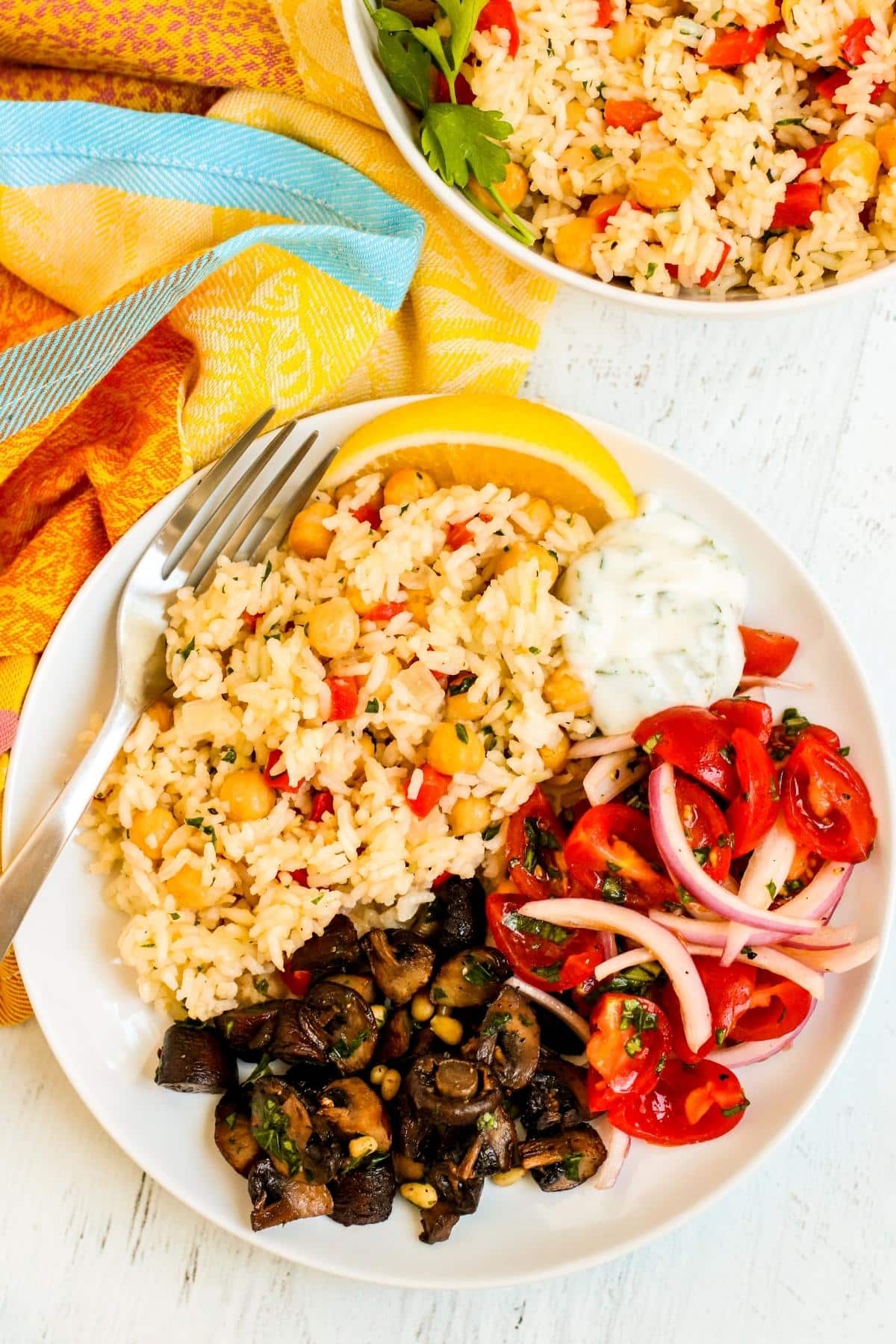
While most people have heard the terms “vegan” and “Mediterranean diet,” it’s not as common to hear the two together. But these lifestyles complement each other very well.
Jump to:
Vegan
People who consider themselves vegan do not consume animal products. They may follow this lifestyle for one or a variety of reasons.
Some people are vegan for their health, while others are vegan for the animals or for the environment. And many are vegan for all of these reasons.
In addition to not eating meat, fish, and dairy, vegans avoid using products derived from animals. For example, they will avoid wearing leather shoes or using cosmetics tested on animals.
Mediterranean diet
Often when we talk about a Mediterranean diet, we immediately think of foods like hummus with chickpeas and sesame seeds, falafel, and Greek salad. But there's more to this amazing lifestyle than delicious food.
According to Mayo Clinic’s Mediterranean diet: A heart-healthy eating plan, the key components of the Mediterranean diet are the following:
- Eating primarily plant-based foods such as vegetables, fruit, whole grains, legumes, and nuts
- Replacing animal-derived fats with healthy fats like olive oil
- Using herbs and spices to flavor foods instead of salt
- Reducing consumption of red meat, poultry, and fish
- Enjoying meals with family and friends
- Getting plenty of exercise
While a Mediterranean diet isn’t new, it’s been in the media a lot recently. For several years running, U.S. News & World Report has rated it the best overall diet. Numerous studies have shown that people living in areas bordering the Mediterranean Sea in Greece, Italy, Spain, France, Turkey, North Africa, and the Middle East are generally healthier and live longer with a lower incidence of chronic disease.
And following a Mediterranean diet is relatively simple and inexpensive compared to other ways of eating. This is a big benefit because it makes this lifestyle easier to stick to in the long term.
A perfect match
Since both are largely based on eating plant-based foods, it’s a natural fit to combine a vegan diet with a Mediterranean diet. And I think you'll find it's a delicious way to eat and live.
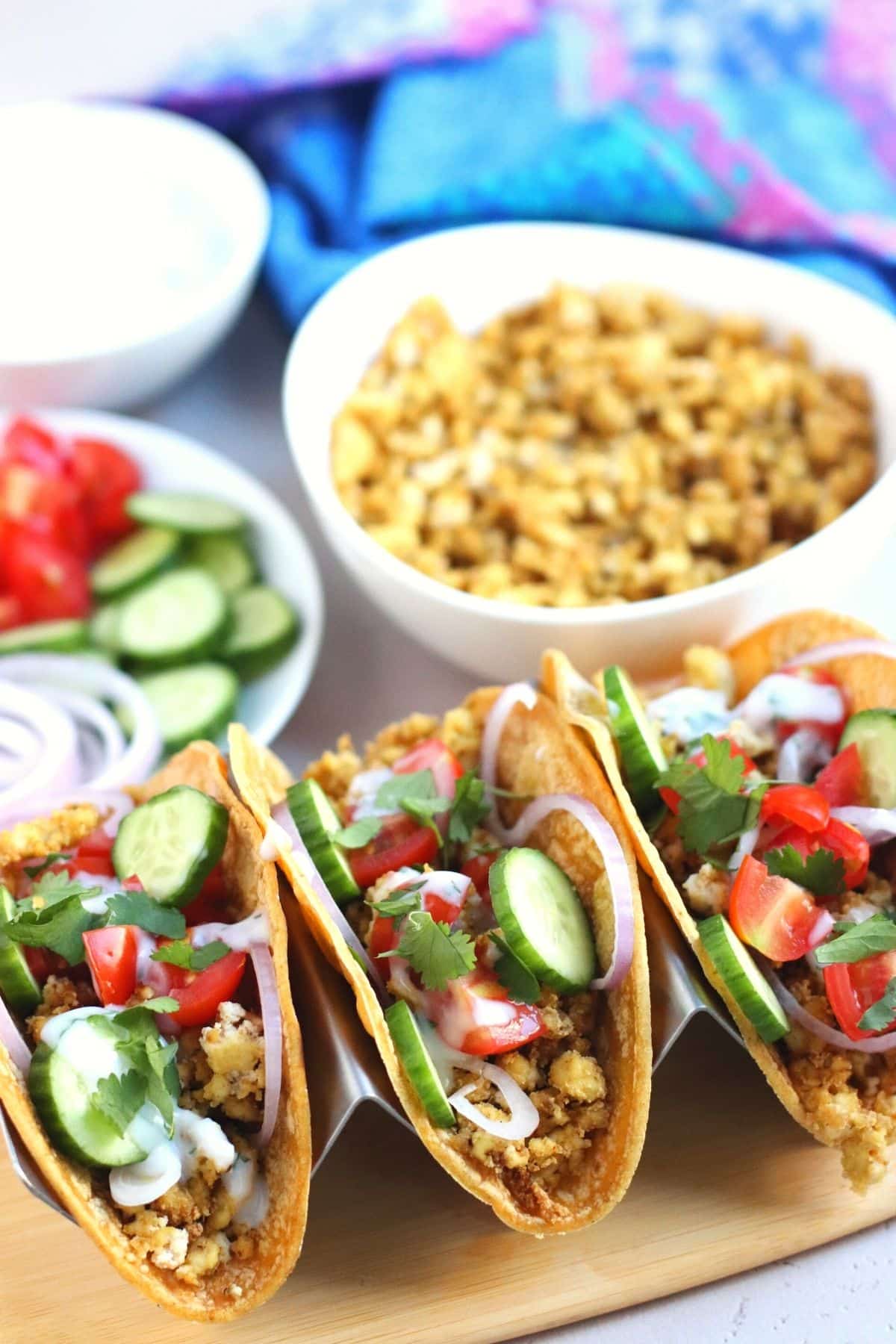
Diet versus lifestyle
I like to refer to a vegan Mediterranean diet as a lifestyle. This is because it encompasses more than just what you eat. In fact, some of my favorite aspects of it go beyond what we put on our plates.
It's really about how we choose to live our lives. And these choices help contribute not only to our physical health, but our mental well-being.
So it’s not just about figuring out what you should eat for breakfast, lunch, and dinner. This lifestyle is about other decisions we make in our daily lives, as well, including moving our bodies, socializing with loved ones, and enjoying nature.
Foods to eat
When it comes to a vegan Mediterranean diet, the foods to eat are varied and plentiful. It’s very similar to a whole-food, plant-based diet (WFPB.)
While the term plant-based is thrown around a lot in marketing these days, for our purposes it refers to foods that are derived from plants. These do not include milk, eggs, or honey.
Whole foods include the following:
- Whole grains (including rice, millet, quinoa, and whole wheat.)
- Vegetables and fruits
- Beans and legumes (including, chickpeas, lentils, black beans, and tofu.)
- Herbs and spices
- Nuts and seeds
The major difference between a vegan Mediterranean diet and WFPB is that a vegan Mediterranean diet includes olive oil. Oils are considered processed foods in a WFPB diet. However, studies show that consuming olive oil in moderation can reduce or slow down the development of cancer and cardiovascular disease.
Olive oil is a good choice for sauteing, roasting, and adding flavor to salads. Use it in place of butter, margarine, and canola and highly processed vegetable oils.
However, use olive oil or alternatives like avocado oil and walnut oil sparingly. While they are heart-healthy, if used in excess they may lead to weight gain since they are high in calories.
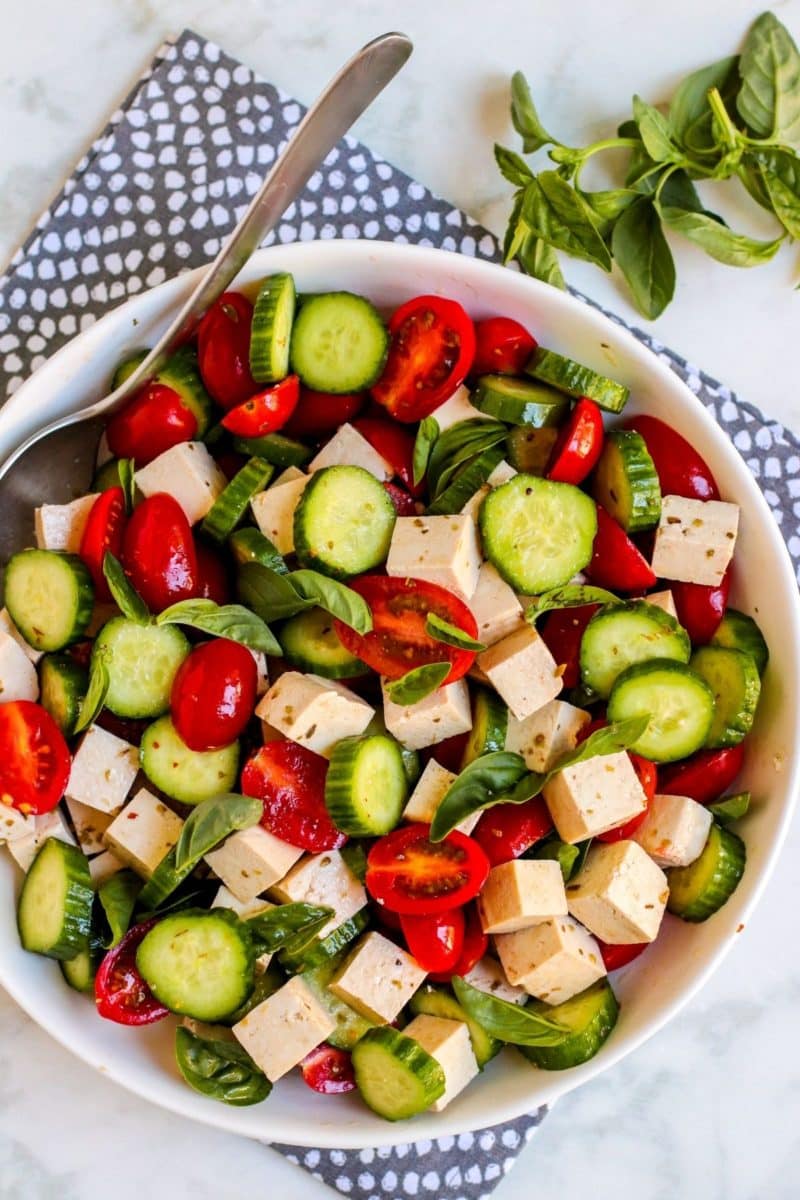
🌱 5 Secrets To Cooking The Vegan Mediterranean Diet Way
Get the FREE 5-day mini email course!
Kitchen staples
When you keep foods that are healthy and delicious in your pantry and refrigerator, it’s much easier to figure out what to eat. Look for simple ingredients that can be eaten alone or combined into flavorful and colorful meals.
These are some favorites I like to keep on hand:
- Whole-grain bread
- Oats
- Brown rice
- Quinoa
- Pasta
- Cashews
- Pumpkin seeds
- Potatoes
- Sweet potatoes
- Carrots
- Leafy greens (lettuce, kale, spinach, etc.)
- Tomatoes
- Avocados
- Cucumbers
- Squash
- Broccoli
- Cauliflower
- Onions
- Garlic
- Fresh and dried herbs and spices
- Olive oil
- Fruit
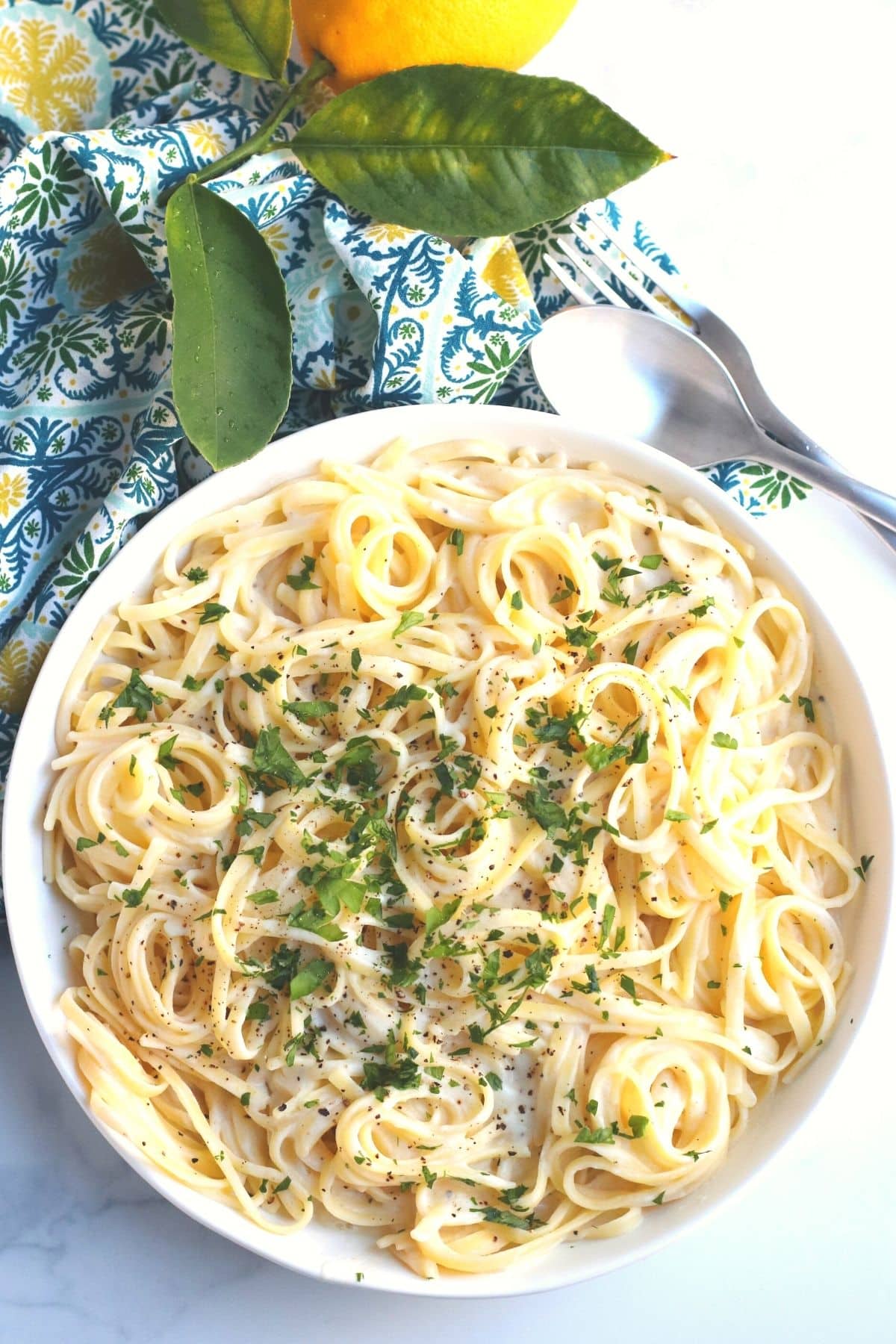
Foods to avoid or to consume in moderation
Other than avoiding animal products including dairy and honey, the list of foods to avoid is relatively short. Most foods can be enjoyed in moderation.
Processed foods
If you’ve been to the supermarket lately, you’ve probably noticed an explosion in the amount of plant-based foods available now. In fact, I can’t think of a single meat- or dairy-based food that isn’t available in vegan form.
However, a lot of these products are highly processed. They are alright to enjoy occasionally, but be aware of their fat and sodium content.
Processed sugar
Another thing to keep your eye on is processed sugar. While desserts like cake and cookies are pleasurable to enjoy on special occasions and with friends and family, try to avoid adding extra sugar to your diet, especially in the form of sugary drinks and treats.
Excess salt
Salt, in moderation, is fine to include, as long as you are not on a low-sodium diet as directed by your physician. However, you may find that you don’t need very much salt when you cook if you’re using flavorful herbs and spices.
I like to wait and add a little salt right before serving. And remember to taste as you go. It’s easy to add in a little more salt, but it’s difficult to take it back out!
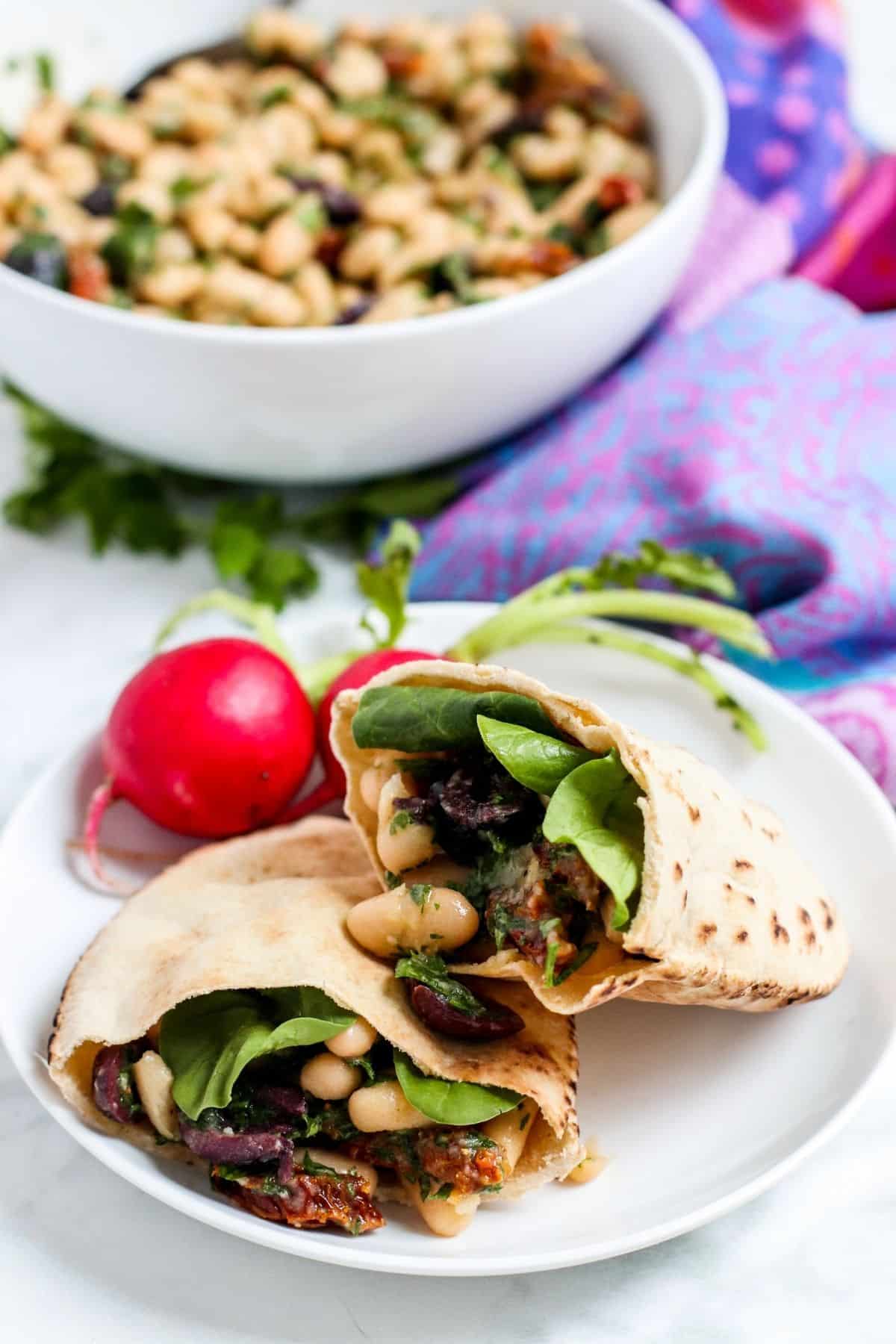
Mediterranean diet versus Mediterranean food
There is a misconception that a Mediterranean diet is synonymous with eating Mediterranean food. However, this is not necessarily the case.
We tend to think of foods that we enjoy in Italian, Greek, and Middle Eastern restaurants such as pasta, Greek salad, falafel, hummus, and kebabs. And while we can certainly enjoy vegan versions of these favorites on a vegan Mediterranean diet, these aren’t the only choices.
Instead, when we talk about a “Mediterranean diet,” we’re looking at the healthy daily habits of the older generation of people of the Mediterranean region and what they eat. Their diets primarily include minimally processed, whole foods including vegetables and fruit, beans and legumes, herbs and spices, whole grains, and olive oil.
Of course, we can take these ingredients and turn them into dishes like Tabbouleh (Lebanese bulgur and parsley salad), Kushari (Egyptian rice, pasta, and lentils), and Italian Pasta Pomodoro, but these are not our only choices.
Rather we can use the principles of a Mediterranean diet to enjoy recipes from around the world. It’s like taking a look at your favorite cuisines through a vegan Mediterranean diet lens.
For example, an Asian-inspired vegetable and tofu stir-fry is a wonderful choice served with brown rice or quinoa. And tacos and other traditional Mexican favorites can be made with beans, corn, and assorted vegetables.
It doesn’t matter if the recipes you choose are not from countries in the Mediterranean region. You can enjoy any food you like from sushi to curry to casseroles if you make them with whole-food, plant-based ingredients.
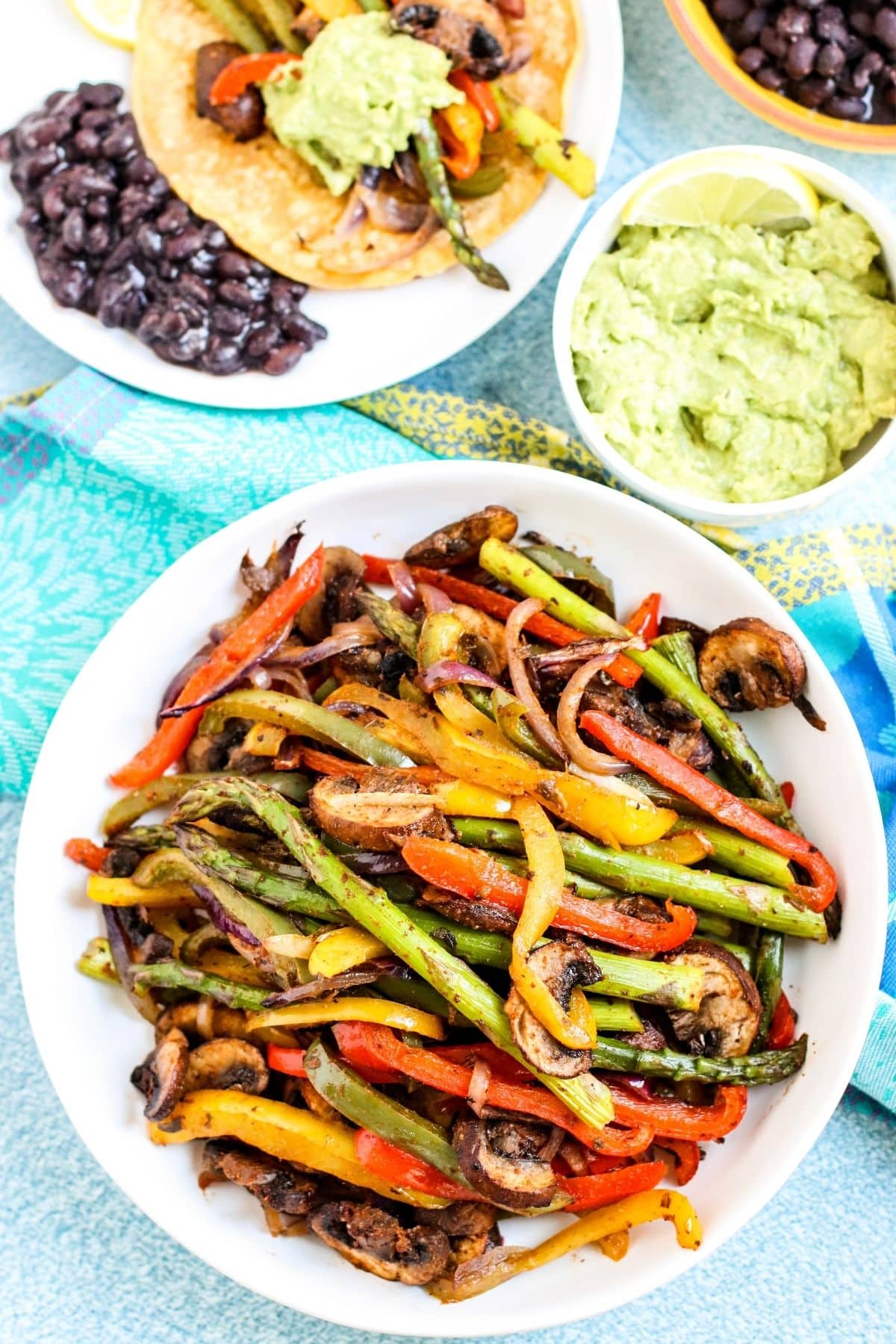
Lifestyle
Some of my favorite things about following a vegan Mediterranean diet go beyond the food. And these aspects contribute to what makes this lifestyle so healthy and rewarding.
Exercise
Ultimately our goal should be to exercise almost every day. But this doesn’t mean you have to train for a marathon or triathlon. Simply moving your body an average of 30-60 minutes a day is all it takes.
If you don’t like to run or ride a bike, keep it simple by going for walks or working in your garden. Natural movement works wonders. Consider leaving your car at home and walking to work or to the store, if feasible. Or take your dog on a tour of the neighborhood.
Stretching, yoga, and dance are also good for the body and mind. The key is finding something you enjoy doing and keeping it consistent.
Socializing
These days we spend a lot of our time in front of screens. And more people than ever live alone. But socializing with family and friends helps contribute to better health and well-being.
One of the best ways to spend time with the ones we love is over a meal. Not only is it enjoyable to have meaningful conversations, it makes us slow down and really savor our food.
And if you’re eating alone, make a conscious effort to really taste every bite. Food is meant for both nourishment and pleasure.
A sense of purpose
What is your reason for getting out of bed in the morning? Studies have shown that finding a sense of purpose in life may lead to increased longevity.
If you’re not sure what your sense of purpose is, think about your personal values. What is important to you?
Some examples may be:
- Taking care of your family
- Being a good friend
- Exploring the world and learning from others
- Helping your community and volunteering
- Improving and maintaining your health

🌱 5 Secrets To Cooking The Vegan Mediterranean Diet Way
Get the FREE 5-day mini email course!
Conclusion
I think you’ll find that following a vegan Mediterranean diet is not only pleasurable but will make you feel good both mentally and physically. You may even find that your overall health improves.
Let’s review the main goals of a vegan Mediterranean diet:
- Enjoy meals composed of vegetables and fruit, whole grains, beans and legumes, nuts and seeds, herbs and spices, and healthy fats like olive oil.
- Get outside and move by doing activities you enjoy like walking or gardening.
- Spend time with family and friends, especially over leisurely meals.
- Have a sense of purpose in life.
- Think of it as a lifestyle, not a strict diet.
Focus on progress over perfection. Take each day one at a time, yet think about the big picture. And if you travel off course, work on making your way back.
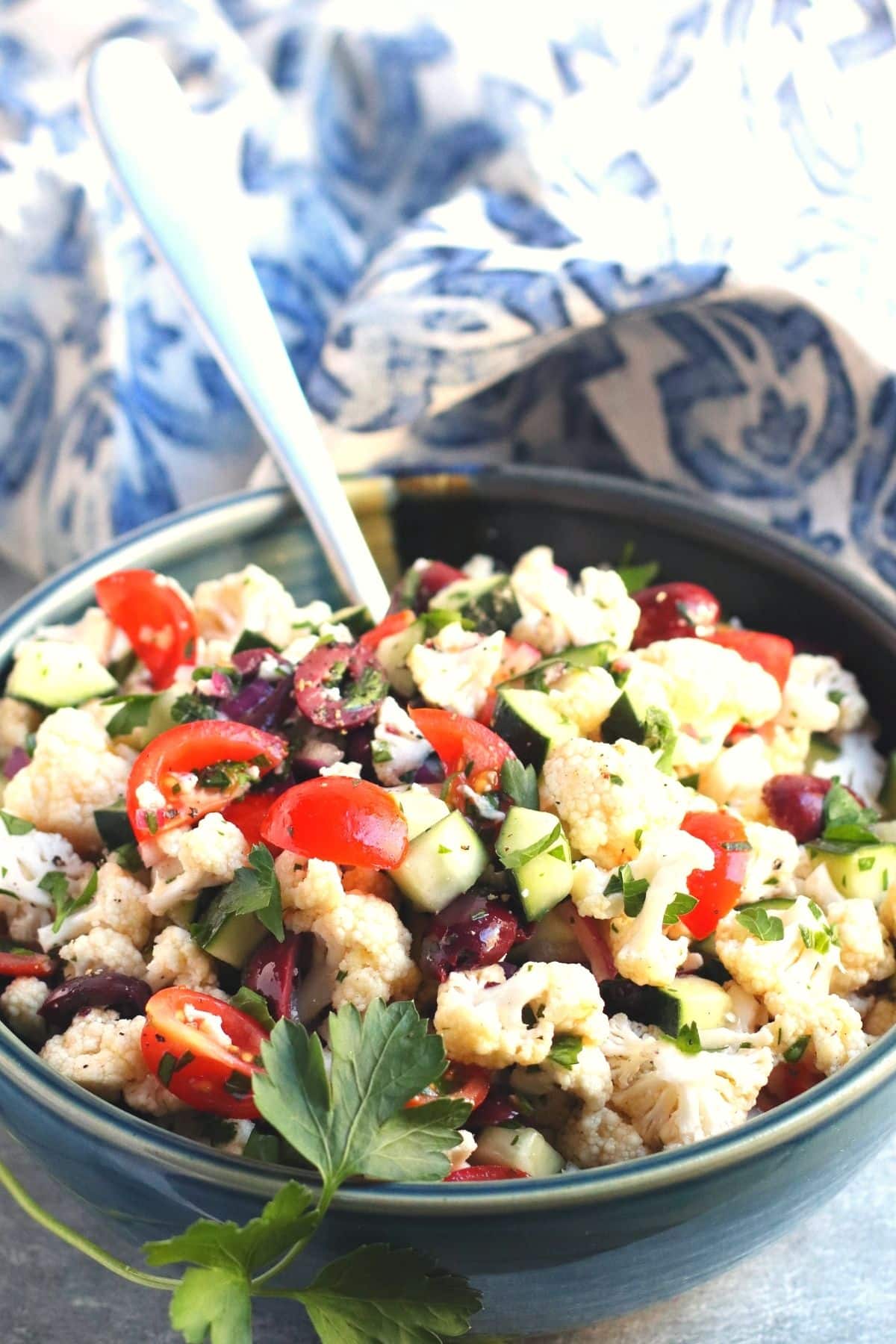
Vegan Mediterranean Diet FAQs
The foods included in the Mediterranean diet are similar to those that make up a whole-foods plant-based diet. These foods include vegetables and fruits, beans and legumes, whole grains, breads, and potatoes, nuts and seeds, herbs and spices, and extra virgin olive oil.
Foods to avoid include highly processed foods, refined grains, processed meats, added sugars, and sugar-sweetened beverages.
Because this lifestyle is based on whole unprocessed foods with an emphasis on vegetables and fruits and includes natural exercise like walking, it's possible to lose weight. Always consult with your physician or other qualified health care provider before embarking on a new treatment, diet, or fitness program.
Start by planning meals around produce, legumes and beans, and whole grains. Cook with olive oil instead of butter. Try plant-based milk and yogurt instead of dairy, and eliminate red meat. And if you like, enjoy a glass of red wine with dinner, in moderation.
When it comes to breakfast, it's okay to think outside the box. Traditional American favorites like whole-grain cold cereal or overnight oats with fruit are wonderful with non-dairy milk. Or try toast topped with vegan Garlic Yogurt Sauce with Herbs with a side of Mediterranean Cucumber Salad. And if you enjoy smoothies, try a Pineapple Green Smoothie.
Yes, you can enjoy pasta topped with vegetable-based sauces. Whole-wheat pasta is a great choice. And gluten-free options include noodles made from quinoa, rice, and/or corn. Some of my favorite recipes include Cherry Tomato Pasta with Fresh Basil, Roasted Vegetable Pasta, and Vegan Orzo Recipes.
Yes, rice is a staple of the Mediterranean diet. It's often eaten as a pilaf with herbs and spices rather than plain. For example, you can try Mediterranean Yellow Rice or Chickpea Rice Pilaf.
Yes, corn is considered a whole grain like wheat, rice, and oats. One of my favorite ways to enjoy it is in a Mediterranean Vegan Corn Salad.
While avocado may not be native to the region, it can definitely be included as a source of fat. And avocado oil is another great option to use in place of butter.
In moderation, dark chocolate is allowed since it doesn't contain as much sugar. Choose dark chocolate with a minimum of 70% cocoa beans for a naturally sweet treat.
Yes, popcorn is a wonderful snack since it's a whole grain. But top it with a drizzle of olive oil instead of butter. And try seasoning it with herbs and spices instead of too much salt.
Yes, you can eat peanut nutter and other nut butters. However, look for ones that don't contain added sugar.
Since the Mediterranean diet is high in vegetables, fruits, whole grains, nuts, and healthy oils, it is considered anti-inflammatory. You can learn more from Harvard Medical School's Foods that fight inflammation.
The Mediterranean diet emphasizes enjoying delicious plant-based meals, moderate daily exercise, socializing with friends and family, spending time in nature, and having a sense of purpose in life.
It's flexible in that there is no one set of rules regarding what you should eat. Rather you can choose the cuisines and dishes you enjoy that are based on vegetables, fruits, whole grains, beans and legumes, nuts and seeds, and extra virgin olive oil. To me, this lifestyle is a recipe for happiness and longevity.
You can still follow a vegan Mediterranean diet if you’re gluten-free. I myself have a gluten sensitivity and have no problems following this lifestyle.
Look for naturally gluten-free whole grains like quinoa, amaranth, and millet. In addition, there are a lot of gluten-free pastas on the market made from either one or a combination of ingredients like brown rice, corn, quinoa, lentils, and chickpeas.
When purchasing bread, be sure to check the ingredients carefully. Some gluten-free breads contain ingredients like eggs and honey.
Some people have an allergy or intolerance to nightshades including tomatoes, eggplant, potatoes, and bell peppers. If you need to avoid nightshades, try some of these substitutions:
Instead of tomato sauce, you can make a pureed sauce with onions and carrots or winter squash. Pesto and sauces made with herbs, olive oil, or olives are also great choices. Or you can make a creamy Alfredo-style sauce using raw cashews or cauliflower.
Instead of eggplant, substitute mushrooms such as cremini, portobello, or shiitake. Instead of potatoes, substitute cauliflower, sweet potatoes, winter squash, parsnips, or turnips. And instead of bell peppers, substitute celery or radishes.
For recipes calling for nuts, often seeds like hemp, pumpkin (pepitas), or sunflower seeds can be substituted. For creamy soups calling for cashews, try pureeing part of the soup in your blender and then adding it back in. And pureed white beans and canned coconut milk are also good substitutions.
Eating at restaurants can be a very pleasurable experience, and you can still enjoy it when following a vegan Mediterranean diet. Most cuisines make it fairly easy to order meals composed of vegetables, whole grains, and plant-based proteins. And I’ve found that most restaurants are happy to assist you when you explain that you are vegan.
If you don’t see anything vegan on the menu, ask if the chef can create something special for you. You may want to review the menu online in advance and call to speak to someone about your options. When ordering from the menu, be aware of sneaky ingredients like chicken stock or butter in rice and anchovies or fish sauce in sauces and salad dressings.
Join the Vegan Mediterranean Diet Recipes Facebook group for recipes, inspiration, and fun!

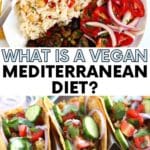
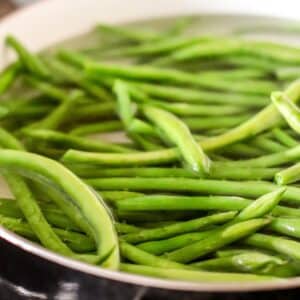
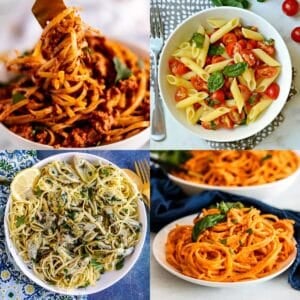
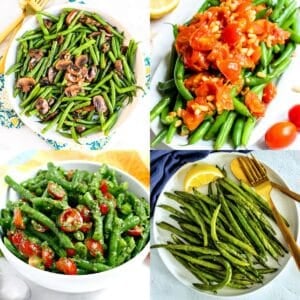
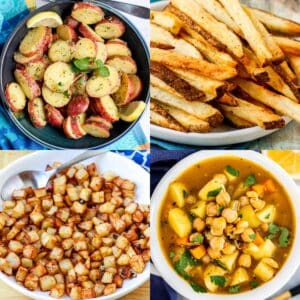
carol perkins
Hi I am transitioning from a plant based no oil no dairy no salt or sugar diet to a less restrictive diet, because I have lost most of the weight I want to loose. My question is: How much olive oil is too much oil. I don't cook with oil but I want to add it to salad dressings for emulsion and roasted vegetables so they don't burn, and some pesto from the basil in the garden. I don't want to gain weight or harm my health, but it seems a little oil is necessary for satiety, and satisfaction. Under 10g a serving in a recipe?
Amy Katz
Hi Carol, Congratulations on the weight loss! I think you will find a plant based Mediterranean diet easier to stick to in the long term because it isn't so restrictive. It's also very satisfying, as you mentioned. As far as olive oil, I don't think you need to worry about consuming too much since you will only be using a little for dressings, sauces, and roasting. I would go by what feels right for you rather than looking at the amount in a recipe. For example, if a dressing looks like it has too much oil in it, start with a little bit and see how it tastes. There isn't a strict number when it comes to how much olive oil a person should consume. In addition, you may want to consult with a nutritionist or registered dietitian who specializes in a plant based diet.
Melissa Weimer
Hey, Amy. Amazing Article. I am following the Mediterranean diet. I was looking for some good recipes. I have some questions and I got the answers here.
After switching to veganism, I have faced many problems like what to eat or what to not. Especially some foods taste are not satisfactory. I have made the Avocado Pesto Pasta by following your recipe. It tastes awesome. I just loved it.
Thanks for sharing!!!.
Amy Katz
Thank you so much, Melissa!